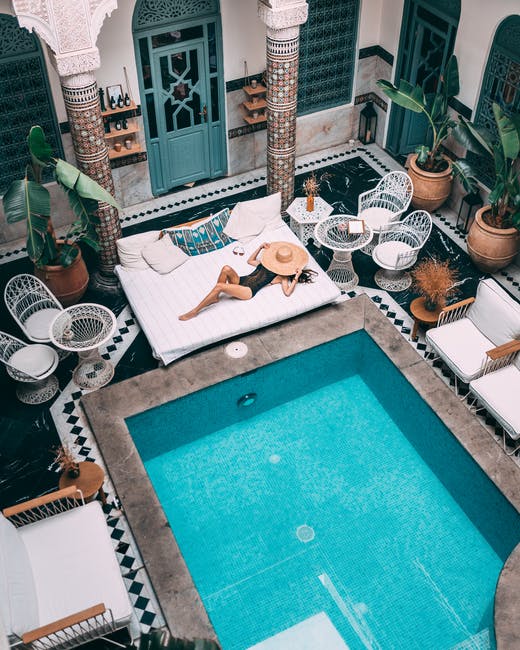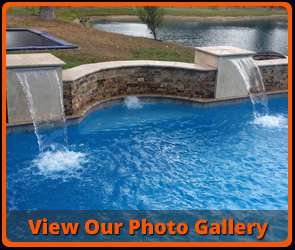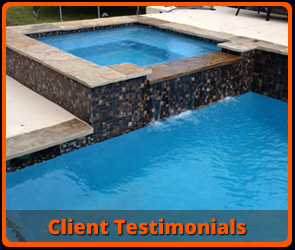When the hot weather hits, it’s not hard to imagine lounging in a pool in your backyard. Adding a pool can be a great place to escape the heat, spend time with your family, and even increase the value of your home.
Choosing between swimming pool shapes can be overwhelming and confusing. If you’re not sure where to start, you don’t need to stress. Your ultimate guide to the most popular pool shapes is below, so keep reading!
Building Materials
When it comes to building a pool, there are several popular and common building materials that you can choose from. What you choose will depend on your design and landscape, as well as your budget.
Concrete
One of the most common materials for pools is concrete. Not only is it durable and lasting, but also allows for almost limitless customization.
Concrete pools are plastered, which allows homeowners to make affordable repairs when needed. The shape of the pool is dug and framed with rebar before the concrete is added.
Vinyl
Vinyl is used as a liner for a pool and not the construction of the pool itself. Instead, the pool form is made out of a variety of materials, placed in the ground, then the heavy vinyl liner is added.
While this is a cost-effective pool material, the liner is going to wear out over time. Eventually, it will need to be replaced in order to keep your pool in good condition.
Fiberglass
Fiberglass pools are usually pre-fabricated and come in one piece. While there are many options and sizes available, it’s not always the best choice for material if you want something customized.
Fiberglass is durable but will need maintenance and care. Eventually, it will need re-coated as the fiberglass ages.
Most Popular Swimming Pool Shapes
Your backyard and personal preferences will determine what popular pool shape is the best for you and your home. An in-ground swimming pool will soon become your family’s new favorite spot to both relax and play!
Rectangle
The most classic and popular rectangular shape does not have to evoke memories of sterile gym pools. While it’s a great option for swimming laps, there are also many additional features you can add to create a true oasis.
The benefit of going with a rectangular swimming pool is that it fits almost all architectural styles and tastes without clashing. You can add custom materials, such as pavers and pebbles. It’s also great for areas where space is limited.
Round or Oval
With either round or oval pools, you’re creating a relaxing and inviting atmosphere. These shapes are great for both play and leisure and are able to accommodate extra designs for a more decorative look.
However, these shapes take up a lot of space. You’ll need to be aware of the amount of space you have and how much you want to devote to a pool.
Free Form
As its name sounds, free-form pools are able to take any shape or style desired. This can include small, private alcoves, deep open areas, or shallow splashing spots.
Free-form pools are great for backyards that are connected with nature in some way. Because they appear more organic and natural, they can enhance the appearance of their surroundings by blending in.
These are also great options for the creative types who want a unique and customized pool. They’re also great if you already have landscaping you want to incorporate and want a pool to fit in organically with your aesthetic.
Geometric
A modern and luxurious take on a pool is to go geometric. These angles, sleek curves, and clean lines will elevate a home to one that is set apart and distinct. L-shaped or T-shaped are common with geometric pools.
Many times, geometric pools will include additional features such as spas and waterfalls. This takes what can be a stark and simplistic design and turns it into something memorable.
If you have a traditional or classic home, then a geometric pool may not be the best choice as the designs can be too contrasting.
Roman or Greek
If classic is the name of the game for your home, then consider a Roman or Greek pool with traditional touches.
A Roman pool is typically square or rectangular in shape, but with two curved areas on the short side of both ends. A Greek pool is rectangular, but curves in on each corner.
If you want an indoor or covered pool, adding classic Ionic, Doric, Corinthian, or Tuscan columns can help emphasize this ancient look. Adding mosaics and pops of color can help add to the Mediterranean feel.
Kidney-Shaped
Both kidney-shaped or figure-8 pools are popular in homes across the country. This is because they can fit a variety of styles and needs without taking up too much space or costing too much in customization. The curved edges are soft, but its length still allows for it to be used for exercise and play.
If the kidney shape feels too dated, think about how you can update it with additional design features to give it a modern, updated feel.
Additional Features
There are many additional features you can add to your pool design. Diving boards, spas, waterfalls or spouts, lighting, swim-up bar, natural elements like rocks and lush vegetation can all be added.
Turning your backyard into a unique and unforgettable space isn’t just limited to the shape of your pool, but how you use these additional features as well! You can take a basic shape and make it feel custom depending on the design additions you choose.
How Do You Choose?
There is a lot that will go into choosing a swimming pool shape for your home. Your budget, the size of your space, and your own tastes will dictate the best choice for your home. Ultimately, the best swimming pool shape is what you want and fits your needs.
If you want to learn more about swimming pool shapes and how you can create an outdoor pool at your home, be sure to contact us! We would love to work with you to come up with the perfect design to help make your dreams a reality.




